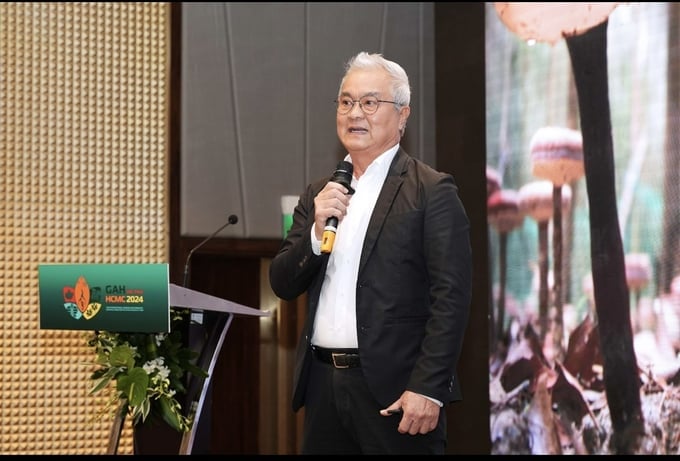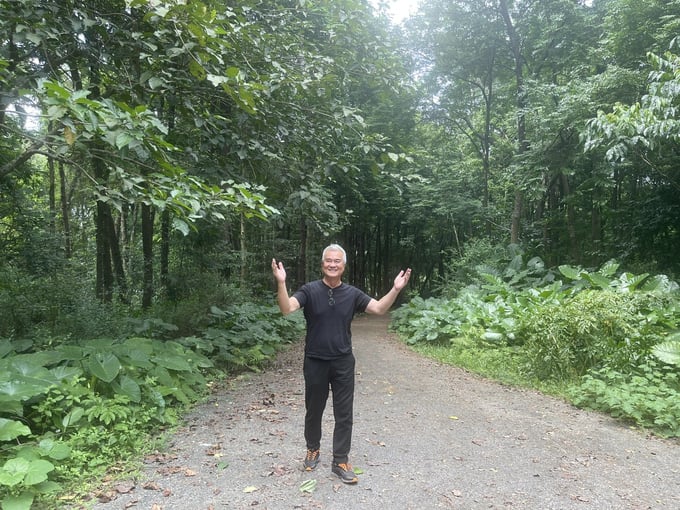November 27, 2025 | 18:54 GMT +7
November 27, 2025 | 18:54 GMT +7
Hotline: 0913.378.918
November 27, 2025 | 18:54 GMT +7
Hotline: 0913.378.918

Dr. Le Hoang The, an environmental science expert.
Dr. Le Hoang The, an environmental science expert with formal education in Japan, has made significant contributions to the agricultural economy as an entrepreneur. He founded The Vos Ecosystem Company Limited, which has implemented numerous reforestation projects in the provinces of Ca Mau, Dong Nai, Kon Tum, Dak Nong, and Lam Dong.
Dr. The has agreed to be the keynote speaker at the seminar "Carbon Credits and Human Resources for the Carbon Credit Market," scheduled for the morning of August 16 at Hall A of the Institute for Public Policy and Rural Development (45 Dinh Tien Hoang, District 1, Ho Chi Minh City). The event will be available both in person and online.
The concept of "carbon credit" is relatively new and widely understood as a certification for trading and representing the right to emit greenhouse gases, namely CO2. According to Dr. Le Hoang The, the carbon credit market is a trading system that allows the buying and selling of greenhouse gas emission rights between businesses, organizations, regions, or countries.
The carbon credit market is divided into two types: voluntary and mandatory. The voluntary market is established on the commitments of various countries under the United Nations Framework Convention on Climate Change (UNFCCC). The mandatory market, on the other hand, functions on bilateral or multilateral agreements wherein buyers participate in transactions to meet environmental policy requirements.
To date, Vietnam is listed among the countries with the highest carbon emission growth rates in the world. As an active member of the international community, Vietnam has committed to achieving net zero emissions by 2050, with specific goals to end deforestation by 2030 and halt coal-fired power generation by 2040.
The Net Zero 2050 strategy has been acknowledged as a central development focus for Vietnam in response to the impacts of greenhouse gases on climate change and global temperature rise. Additionally, frequent and severe extreme weather events, including storms, droughts, floods, and heatwaves, pose significant effects on agriculture, forestry, and industry. Neglection of carbon credits can further exacerbate environmental pollution issues, subsequently impacting human health, quality of life, and biodiversity in both terrestrial and aquatic ecosystems.
Dr. Le Hoang The asserted that Vietnam possesses significant potential for supplying carbon credits. Accordingly, Vietnam's forestry sector is estimated to house at least 57 million carbon credits, which is equivalent to 52 million tons of CO2 available for trading with international organizations. With the inclusion of both its forest and ocean areas, Vietnam can potentially house up to 5 billion carbon credits. This considerable potential can be attributed to the country's extensive terrain across 16 degrees of latitude, which not only harbors a large volume of carbon credits but also offers potential for developing a superior type of carbon credit known as organic carbon.

Dr. Le Hoang The estimated that Vietnam houses approximately 57 million carbon credits stemming from its forests.
Dr. The highlighted the importance of carbon credits in the growth equation. The carbon credit market is driven by corporate climate commitments and consumer interest in mitigating climate change. However, the establishment of a carbon credit market extends beyond the idealistic notion that “one tree can grow into a thriving forest.” Conversely, it requires a skilled workforce capable of performing technical operations, negotiations, and transactions.
According to Dr. Le Hoang The, at least 150,000 workers need to undergo professional training in the immediate future in order to create a workforce necessary to develop a carbon credit market for Vietnam. This workforce must be equipped with in-depth knowledge of validation mechanisms, documentation, reporting, and assessment of various carbon credits. Furthermore, Vietnam's carbon credit market operations depend critically on the training of carbon auditors with specialized skills and international certification.
On the other hand, Dr. Le Hoang The emphasized that training human resources for the carbon credit market will promote the establishment of a carbon credit exchange in Vietnam. Consequently, companies committed to reducing emissions will be incentivized to purchase carbon credits. Various other countries within the region, such as Indonesia, have focused on training carbon credit brokers. As a result, Vietnam must enhance its training efforts to seize economic development opportunities within the global carbon credit market.
On August 16, 2024, the Institute for Public Policy and Rural Development, in collaboration with Vietnam Agriculture Newspaper and Vos Ecosystem Holdings Company Limited, will host a seminar titled “Carbon Credits and Human Resources for the Carbon Credit Market.”
Venue: Hall A, Institute for Public Policy and Rural Development, 45 Dinh Tien Hoang, District 1, Ho Chi Minh City.
Format: In-person and online via Zoom.
Meeting ID: 915 7715 7066
Password: 160824
Translated by Nguyen Hai Long

(VAN) According to Mr. Vo Minh Thanh, Director of the Tay Ninh Department of Agriculture and Environment, Resolution 57 has created a new development pathway for the locality, shifting from traditional toward modern agriculture.
/2025/11/26/4909-2-154329_878.jpg)
(VAN) Pearl grouper farming in HDPE cages not only delivers economic efficiency but also contributes to protecting the environment, creating jobs, and promoting marine-based experiential tourism.

(VAN) The model of making a living under the forest canopy through the agroforestry system in Van Son commune, Bac Ninh province, is expected to generate an annual income of approximately VND 30 million/ha.

(VAN) Many enterprises in Can Tho are harnessing natural energy and reducing greenhouse gas emissions in their production processes, thereby contributing to the promotion of a sustainable green transition.
/2025/11/24/3536-2-112800_176.jpg)
(VAN) Dong Nai now has tens of thousands of hectares of forests certified for sustainable management, and this area will continue to be expanded in the coming period.

(VAN) Vinh Ha hamlet (Dai Xuyen commune, Hanoi) is shifting away from small-scale farming as households adopt bioscurity into their breeder chicken models.

(VAN) Heavy rains make aquatic species more vulnerable to disease. Proactive water management and high-tech systems help farmers prevent outbreaks and protect yields.